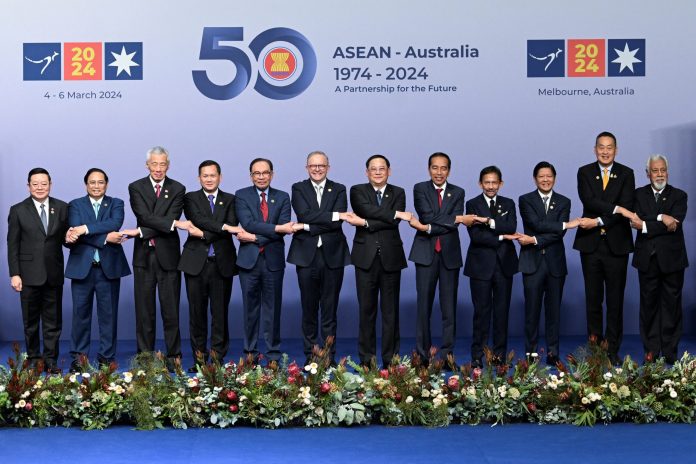ASEAN (the Association of Southeast Asian Nations) has become a significant player in the global economy, with its trade expanding rapidly as it integrates into global markets. Australia is keen to deepen its ties with ASEAN, not only to increase trade and investment but also to work together in defending multilateralism and supporting the rules-based international trading system. Together, ASEAN and Australia can develop a sustainable economic framework underpinned by a Single Green Market.
ASEAN’s growing role in global trade
In 2023, visitors to Jakarta couldn’t miss the displays promoting Southeast Asia as the “epicentre of growth,” highlighting ASEAN’s position in the global economy. The region’s GDP growth is expected to remain robust, at around 4% annually over the coming decade, exceeding that of both the G7 countries and the European Union, and standing alongside China’s performance.
However, ASEAN is not yet a single unified market. Only about 20% of its trade occurs within the region, significantly lower than the intra-regional trade levels in North America (40%) and Europe (60%). Despite this, ASEAN’s goal is not to replicate the closed, inward-facing models like the EU or NAFTA/USMCA but rather to integrate more fully into the global economy. By enhancing connectivity and cooperation across its member states, ASEAN seeks to foster long-term growth and development that contributes to its standing as a key player in global trade.
Enhancing Australia–ASEAN economic ties
Australia sees strengthening ties with ASEAN as vital to its broader economic and strategic interests. With trade and investment relations not yet fully realised, the Australian government has identified the region as a key partner in its economic strategy. Building stronger commercial links with Southeast Asia will offer Australian businesses greater access to a dynamic market, while also supporting ASEAN’s broader goal of economic integration.
Australia’s engagement with ASEAN should not be solely driven by trade diversification or economic competition with China. The true value lies in working together to support ASEAN’s long-term integration efforts, focusing on lowering trade and investment barriers, reinforcing the WTO-based trading system, and encouraging policies that facilitate rapid decarbonisation in the region.
Collaborating on a sustainable economic future
One of the most urgent areas for collaboration between ASEAN and Australia is the development of a Single Green Market. As the global community faces mounting challenges related to climate change, the region must embrace a green transition. Australia’s support for ASEAN’s sustainable development agenda could play a significant role in fostering a regulatory framework that promotes the free trade and investment of green goods, technology, and financing.
With the United States reducing its involvement in multilateral economic governance, ASEAN must take the lead in fostering solutions to transnational policy challenges. Platforms such as the ASEAN–Australia–New Zealand Free Trade Agreement (AANZFTA) and the emerging Regional Comprehensive Economic Partnership (RCEP) will be crucial to facilitating these efforts. Through these regional frameworks, ASEAN and Australia can work together to reinforce a rules-based, open, and sustainable economic order that addresses both economic and environmental challenges.
